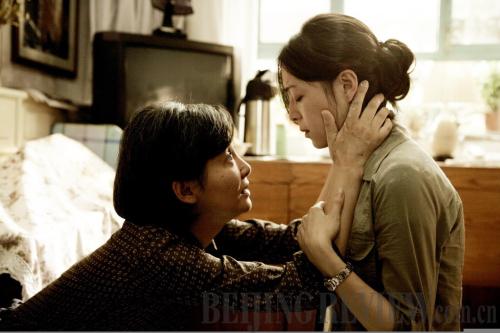|
 |
|
DIFFICULT RECONCILIATION: A still from Aftershock depicting the reunification of a mother and her daughter torn apart by the Tangshan earthquake 32 years earlier (CFP) |
Since being released nationwide on July 22, Chinese film director Feng Xiaogang's latest film Aftershock has brought in more than 500 million yuan ($73.5 million) at the box office by August 8, a new record for a domestic movie.
The tearjerker tells a moving story of a family after a devastating earthquake hit Tangshan, a middle-sized industrial city in north China's Hebei Province, and took the lives of 240,000 people in 23 terrible seconds on July 28, 1976.
A young mother of 7-year-old twins had to give up her little girl to save her son. The painful decision made by the young mother changed the whole family's destiny.
The little girl, thought to be dead by her mother, was later saved and adopted by a childless couple who thought she was an orphan.
More than 30 years later, another big earthquake struck Wenchuan County of southwest China's Sichuan Province on May 12, 2008, leaving about 87,000 people dead. The twin brother and sister who had experienced the terrible nightmare of the 1976 Tangshan earthquake, both headed to Sichuan to be volunteer rescuers, as a huge number of survivors of the Tangshan earthquake did. The family torn apart by the quake is finally reunited in another disaster.
The film depicts how the wound that the earthquake left on the girl's heart gets healed. The girl finally forgave her mother, who had lived in extreme sorrow and self-blame in the 32 years following the disaster.
Although a good number of special effects are employed in the movie to show the might of a natural disaster, the movie is not like 2012. Audiences were deeply moved by the family love depicted in the movie. Everybody in the cinema was in tears, including those who were born in the 1980s and 1990s who have no memory of that calamity took place in Tangshan.
"The movie reminded us of the Wenchuan earthquake two years ago, and it let us feel how the people in the quake-hit area suffered both materially and psychologically," said an audience during an interview with China Central Television.
Feng said he had not intended to play upon the audiences' emotions, but hoped people would learn more about true love in families.
| 